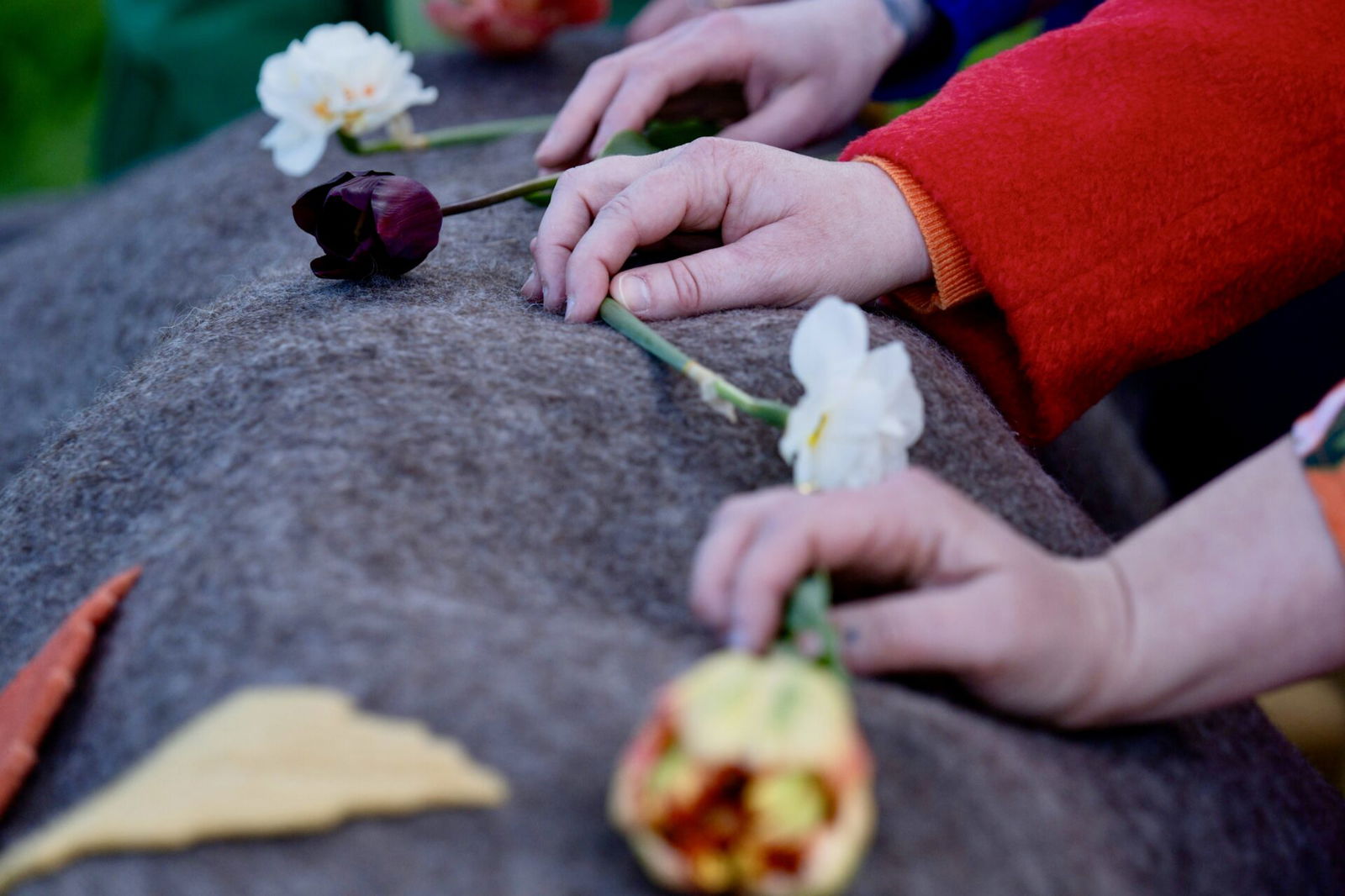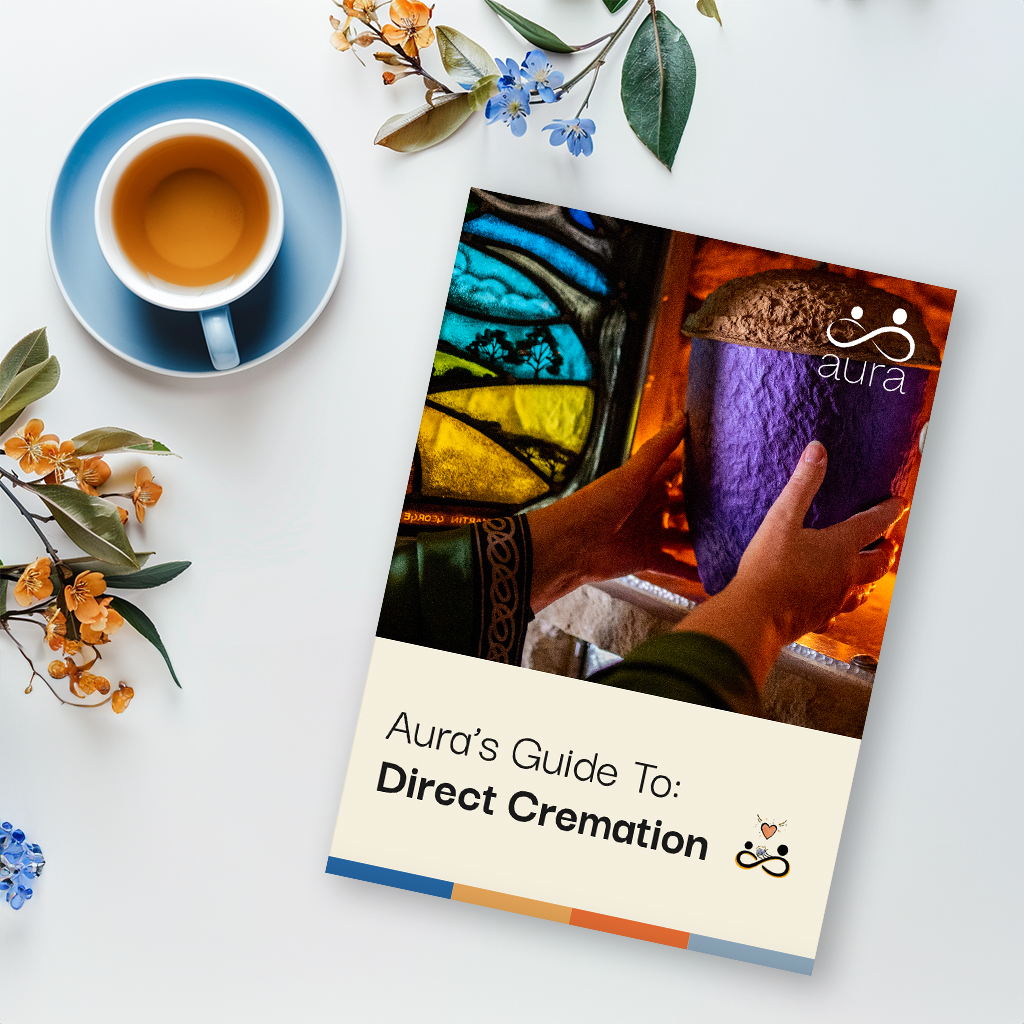




Written by Emily Cross.
17 minute read

Funerals hold deep cultural and personal significance for many people in Britain, reflecting centuries-old customs while constantly adapting to modern values. You may have come to this article looking for information about funeral traditions because you’re in need of some ideas for planning your own funeral, or for a loved one.
Planning a funeral, whether it’s ahead of time or needed urgently is seldom an easy task. Not only can it be emotionally challenging, but the list of things to be taken care of may feel overwhelming and exhausting. Aura is here to help in making the process as simple and stress-free as possible, offering only the highest level of compassion and care. We want to support you in bringing your vision to life, whatever that may be, and we hope this article will provide you with some good background information about funeral traditions in Britain.
We will explore the historical roots, traditional practices, regional variations, and evolving trends in British funerals.
Key takeaways:

British funeral traditions are a reflection of the nation’s profound respect for those we have lost, its cultural diversity, and the enduring value placed on community and family. Grounded in centuries-old practices, these traditions have evolved to include modern preferences while retaining their meaningful essence. From funeral hymns echoing through ancient church walls to modern-day memorial services, these funeral ceremonies remain important experiences for mourning and celebration.
Many people worry about ‘getting things right’ when attending a funeral. In Britain, funeral etiquette is generally about showing respect rather than following strict rules. Guests are usually expected to arrive on time, behave quietly and thoughtfully during the service, and follow any guidance given by the family or funeral director. Phones are typically switched off, and conversation is kept low-key and considerate.
Clothing is traditionally formal and subdued, with black or dark colours being common. However, this has become more flexible over time, and families may request specific colours or styles to reflect the personality of the person who has died. It’s important to remember that there is no expectation of perfection. Families understand that funerals are emotional occasions, and kindness and presence matter far more than following every convention exactly. Expectations can also vary between families, cultures, and beliefs, so it’s always acceptable to gently ask if you’re unsure.
Funerals in Britain have long served as an important social and family ritual. Historically, they were not only a way of honouring the person who has died, but also a chance for communities to come together, share grief, and offer mutual support.
Traditionally, mourning in Britain was marked by clear social customs. Black clothing was worn for extended periods, mirrors were sometimes covered, and social activities were limited as a sign of respect and reflection. Widows, in particular, were once expected to observe long periods of formal mourning.
Over time, these customs have softened significantly. While black remains a common colour at funerals, many people now wear dark neutrals or even brighter colours if requested by the family. Formal mourning periods are no longer widely expected, and people are encouraged to grieve in ways that feel right for them.
For those unsure what is expected today, it’s reassuring to know that modern British mourning customs prioritise personal comfort and emotional wellbeing. There is no single ‘correct’ way to grieve, and most families are simply grateful for support and understanding.
The customs surrounding British funerals have seen significant transformations over time. In earlier centuries, funerals were led by religious rites, particularly within the Church of England. However, societal changes and a decline in religion in the UK have influenced modern practices. Today, services might include personal anecdotes, secular readings and nontraditional tributes such as video montages.
Celebrations of life have also risen in popularity as a new way to commemorate a loved one’s life, achievements and unique personality. Direct cremations offer a transparent and no-fuss funeral alternative, allowing the family to throw a gathering at a location and date of their choosing, catering towards those who wish to prioritise simplicity and keep funeral costs down.
Other influences, such as immigration and multiculturalism, have added layers of diversity, blending older British customs with elements from other cultures.
British traditions are changing with the advancement of technology, the public’s shifting priorities, and an evolution in how we start conversations about death and dying. Nowadays, many are looking into options that reflect contemporary values, such as simplicity, cost-effectiveness, and environmental responsibility. Aura is proud to be on the forefront of these alternatives by providing attended and unattended direct cremations and prepaid direct cremation plans across mainland Britain.
These services provide the basics of a cremation with space and flexibility to customise, creating a middle ground between full funeral ceremony and basic cremation. Our empathetic and experienced team are there to guide you and take care of the sometimes tedious administrative tasks involved in arranging a funeral. The heart of Aura are our Aura Angels, known for their unique ability to both provide a listening ear and offer emotional support when you need it the most. They take care of all of the intricacies of funeral planning while keeping you informed at every step of the way.
With our industry-leading team of experts, different service options and plans, and ability to customise a service to your preferences, Aura is at the forefront of modern funeral practices in the UK.
The wake, traditionally held before the funeral, offers a space for family and friends to gather, reflect, and remember the person who has died. Today, a wake is more commonly held after the funeral, but can be held at either time, as per the family’s preferences.
In the past, wakes involved keeping vigil over the body, a practice rooted in Celtic traditions. The act of sitting vigil involves a period staying awake for a period of time to watch over someone who has recently died, typically observed overnight. Modern adaptations can include informal gatherings at a home, pub, or community hall. With the advancement of technology, virtual viewings and gatherings are also becoming more common, meaning distant relatives and friends can participate from afar.
Central to British funerals, the service generally includes readings, prayers, and eulogies that honour the person’s life and achievements, often accompanied by the presence of immediate family. Hymns and organ music are played to create a reflective atmosphere, while more modern ceremonies may incorporate contemporary poems, readings or songs. Religious services frequently take place in churches, with crematorium chapels and outdoor venues being increasingly popular options for non-religious or nontraditional ceremonies.
A funeral cortege is the procession that accompanies the person who has died on their final journey, usually from a funeral home to the place of the service or burial. The hearse traditionally leads, followed by close family and other mourners. The order of vehicles once reflected social hierarchy and closeness to the person who had died, though this meaning has softened over time. Today, a cortege is less about formality and more about shared respect.
While funeral processions were once very common across Britain, they are now optional. Many families choose not to have a cortege at all, particularly with direct cremations or private services. There is no obligation to include one, and its absence does not diminish the significance of the farewell.
Burial has traditionally been the most common practice in Britain, sometimes accompanied by formal processions to churchyards. However, cremation has a place in UK history, and has gained popularity in modern times due to their ability to keep funeral costs down, simplicity and reduced land requirements. Families often consider personal beliefs, cost, and environmental concerns when choosing a cremation vs burial.
Burials require an individual or family to take care of the purchase, maintenance and opening of a burial plot, amongst other charges and fees. Simple cremations, with or without attendees, can offer affordable and flexible choices to families. For those looking for a more straightforward and nontraditional funeral, this type of service could present the perfect way to honour a loved one.
Ultimately, what type of service a family chooses is a very personal decision. Whether you choose burial or cremation, there are opportunities to ensure either choice fits your needs as a family.
In England, funerals often follow established traditions, including processions led by hearses and services in historical churches. Mourners may gather for tea and light refreshments after the burial or cremation, reinforcing the importance of community support. Though this format is traditionally what’s thought to be customary in English funerals, a portion of funerals in England are shifting away from such formalities in favour of more casual funerals.
Scotland is renowned for its distinctive funeral practices, such as playing bagpipes to commemorate the person who has died. The “kirking” tradition involves a religious blessing of the body before burial. This practice underscores the importance of spirituality in Scottish culture, with many services conducted in historic churches or chapels. Scottish wakes are vibrant yet reflective, emphasising communal gatherings to celebrate life. Historically, they involved keeping vigil over the person who had died before burial. Today, wakes often serve as an opportunity for family and friends to gather, share stories, and celebrate the life of the person who has died before or after burial or cremation.
Welsh funerals often feature rich choral traditions, with mourners singing hymns to create a deeply emotional send-off. Eulogies emphasise storytelling, recounting the life, character, and contributions of the person who has died. Poetry, particularly works by Welsh authors, may also feature prominently in funeral services.
In Northern Ireland, Irish wakes are a centuries-old tradition and are an integral part of funeral customs. They combine mourning with storytelling and communal spirit, most often taking place in the home of the person who has died, or a family member. Funeral processions are also a notable feature of Northern Irish funerals, with mourners walking together in solidarity. The strong sense of camaraderie in Northern Ireland is deeply felt at funerals.

With growing environmental awareness, green burials have become a popular choice, often accompanied by the use of natural funeral flowers. These services often involve biodegradable coffins, woodland burial sites, and memorial tree planting. Eco-conscious funerals align with a broader societal shift towards sustainability and responsibility for the care of the planet.
Increasingly, British funerals are tailored to reflect the individuality of the person who has died. From bespoke music selections to photo montages, personalisation allows families to celebrate lives in meaningful ways. Celebrations of life focus on cherished memories with a person, and highlighting the joy and impact they had on people’s lives.
Technology has revolutionised funeral practices, introducing innovations like live-streaming services and online memorials. These new tools allow families to connect across distances and preserve digital tributes for future generations.
The arrangement of funerals in the UK is usually handled by a funeral director. DIY funerals are an empowering choice for those who wish to take all of the responsibility and control of managing the funeral proceedings. These responsibilities are lengthy, and include everything from transportation of the person’s body to delegating tasks to others such as who will deliver speeches. For families who feel rewarded by this detailed preparation, DIY funerals can come in at a much lower price tag than traditional funerals.
Some people wonder if they actually have to have a funeral in the UK. With the rising cost of funerals in mind, it’s no wonder some are considering foregoing a service. In the UK, holding a funeral is not mandatory. Many prefer no service at all, instead opting to handle the care of the person who has died in the simplest way possible. This is known as a direct cremation, and is typically the most cost-effective option.
Unattended direct cremation differs from a traditional funeral as it involves no viewing, service at the crematorium, procession, or attendance by family and friends. Instead, with Aura, the person who has died is collected and cremated with utmost respect, but without a ceremony. Their ashes can then be scattered in the crematorium’s Garden of Remembrance, picked up, or hand-delivered to a close relative or friend for a nominal fee.
British funerals are most often attended by family, friends, and close acquaintances. Some services are open to the wider community, while others are strictly by invitation only. The size of the gathering depends on personal preference and cultural norms, accompanied by the person’s reputation within the community.
Funeral etiquette in the UK can vary widely, depending on the type of service and wishes of the person who has died or their family. In general, mourners are likely to dress in sombre attire, typically black or dark colours, and arrive punctually.
If you’re attending a service and wondering what to take to a funeral, the most important thing is simply your presence and respect. Some people may choose to bring a card, a small bouquet, or a memory to share, but there is no obligation to bring anything at all unless the family has made a specific request.
Offering condolences, providing meals, or following up with visits are very comforting ways to show support for grieving families. These gestures demonstrate care and compassion, helping families navigate their loss.
Traditional British funeral attire includes black clothing and subdued styles, reflecting mourning, solidarity and community solemnity. However, some modern funerals encourage colourful clothing or specific items of adornment to celebrate the life of the person who has died, so the dress code may vary.
The family of the person who has died will let attendees know if there are alternative dress code requests so that people will know how best to arrive and show their respect.
It is traditionally customary to bring flowers or contribute to a charity in memory of the person who has died. This focus on giving underscores the communal nature of mourning in Britain, blending tradition with charitable acts of kindness, such as sending flowers. Sharing a website to a special fund online is becoming an increasingly popular way to give financially, with people able to leave comments and show support through a wider online audience.
British funeral traditions continue to evolve. Many families now prioritise personal meaning over formal obligation, choosing ceremonies that reflect individuality, simplicity, or cultural diversity. Modern adaptations might include informal venues, personalised music, eco-friendly choices, or gatherings held separately from the funeral itself.
What matters most today is not following tradition perfectly, but creating a farewell that feels right for the person who has died and those remembering them. Aura supports this flexibility, offering guidance without pressure and helping families make choices that bring comfort and peace of mind.
Aura is proud to be part of the history of funerals in Britain. As our society continues to change and evolve, so will we, ensuring we are always meeting the needs of families in the UK.
As a family-led company, Paul Jameson founded Aura in 2019 after being diagnosed with motor neurone disease. Inspired by his personal confrontation with mortality and experience in end-of-life planning, he created Aura to ensure families across the UK could benefit from his journey. Today, Paul leads the company alongside his son David, our CEO, and family friend Ben, our COO. Aura’s mission remains deeply personal—to offer the kind of compassionate service Paul would want for his own family.
At Aura, we offer direct cremation services for those needing to arrange a funeral immediately, and prepaid funeral plans for those preparing for the future. Rated 4.9/5 stars on TrustPilot, Our excellent ratings reflect the trust and gratitude of the families we’ve had the privilege to serve. We are committed to delivering care that is respectful, patient, and compassionate. With our dedicated team of Aura Angels ready to support you and answer any questions, we’re here whenever you need us.

If you’d like more information about direct cremation and Aura’s funeral plans, then our downloadable guide can help. Find out why others are choosing this affordable, no-fuss alternative to traditional funerals and why it might be right for you too.
Download our guide by clicking the link below and learn more about this simple funeral plan option.
Traditional British funerals often include a religious or formal service, hymns, eulogies, and either burial or cremation. A wake may be held before or after the funeral, offering loved ones a chance to gather and remember the person who has died.
Cremation has become more popular than burial, especially with options like direct cremation, which is simpler, more affordable, and allows for flexible memorial gatherings later on.
A typical service includes:
Readings or prayers
Eulogies or tributes
Hymns or music (traditional or modern)
Reflection or silence
A final farewell before burial or cremation
Yes.
Scotland: May include bagpipes and a “kirking” blessing.
Wales: Strong choral and poetic elements.
Northern Ireland: Often features wakes at home and funeral processions.
England: Traditionally formal but increasingly personalised or simplified.
No. There is no legal requirement to hold a funeral service. Many families now choose direct cremation, which forgoes a service altogether and is the most cost-effective option.
Yes. Technology has made livestreamed services and digital memorials more common, especially for friends and family who live far away.
A celebration of life is a less formal alternative to a traditional funeral. It focuses on honouring the individual’s personality, memories, and legacy, often through music, storytelling, and personal touches.
A DIY funeral is when a family organises everything themselves without using a funeral director. This can include transport, paperwork, service arrangements, and body care. It can be cost-effective, but involves significant effort and legal responsibility.
Yes. A prepaid funeral plan allows you to arrange and pay for your funeral ahead of time, locking in today’s prices and easing the burden on your loved ones when the time comes.